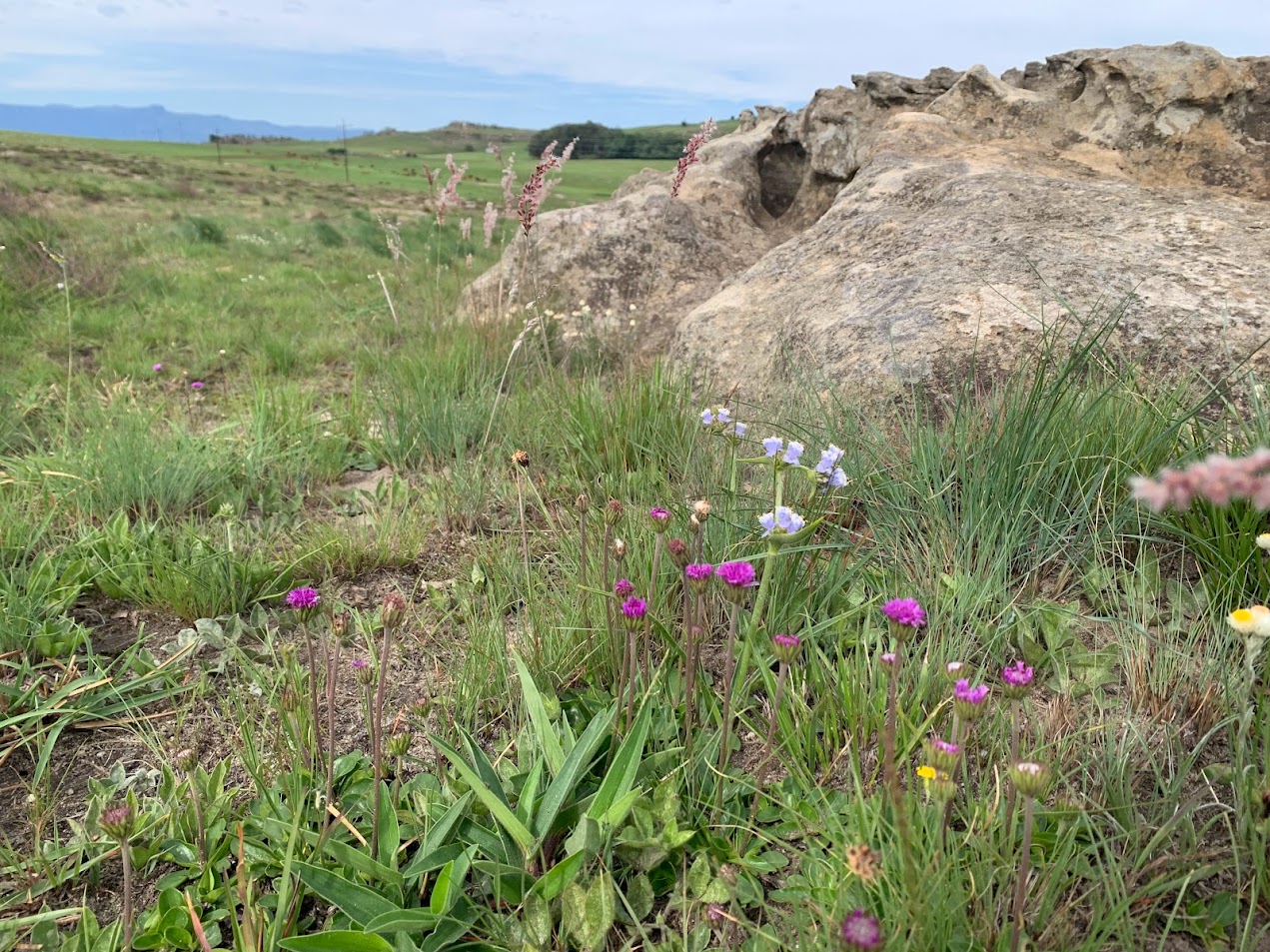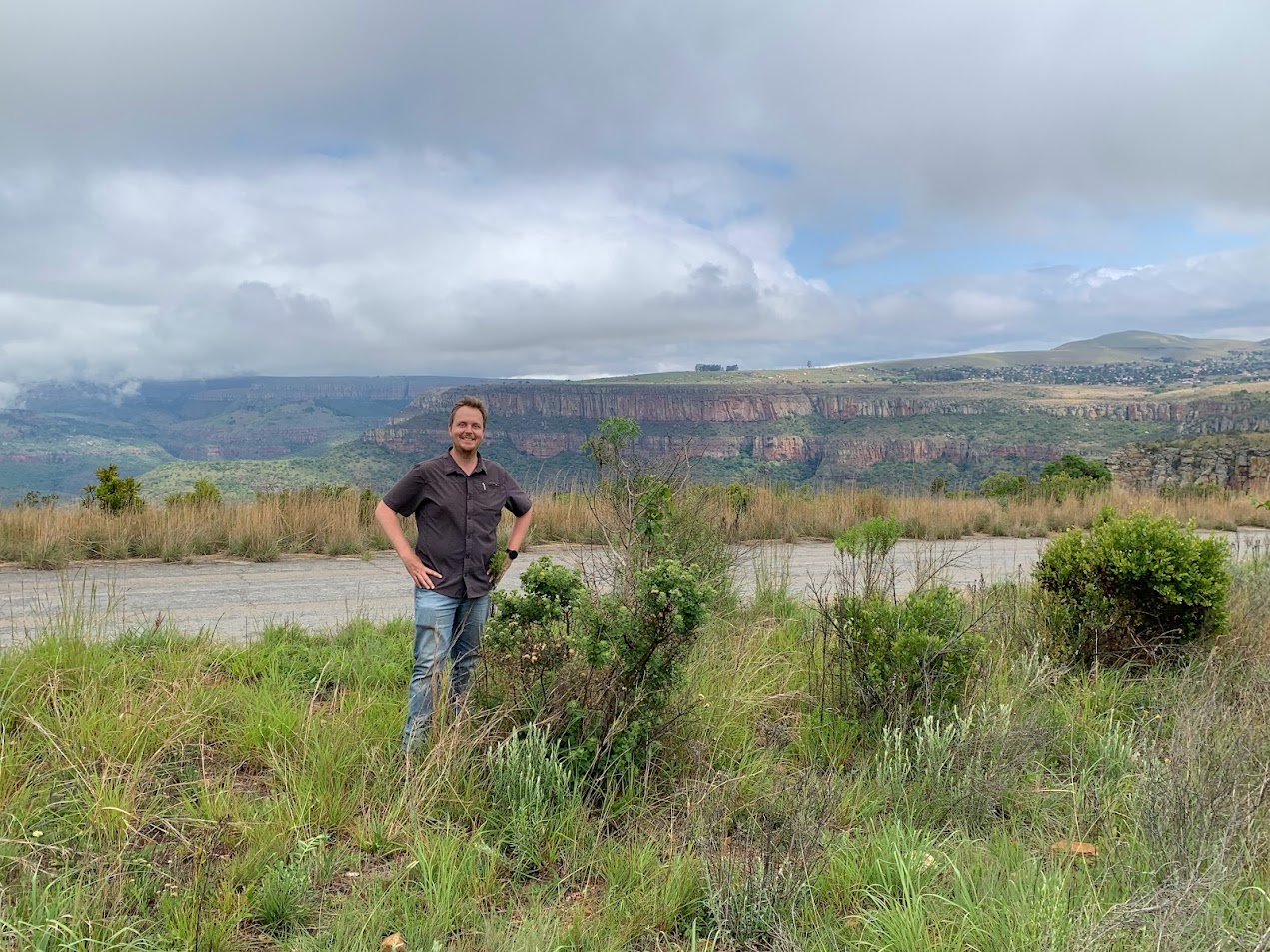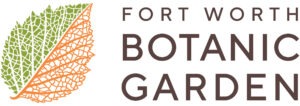
- News & Publications
- News
- Support
- About Us
- Education
- Research
- Research Programs
- Herbarium
- Library & Special Collections
- About the Library
- Library Exhibitions
- The Arader Natural History Collection of Art
- The Stansbery Collection for Botanical Art
- Rare Book Room Collection
- The Oliver G. Burk Children’s Collection
- History of the Library
- Library Inventory
- Library Archives Collection
- Archive Lens
- Collections Lens
- Botany Stories
- Discovery Resources
- Participate
- BRIT Press
- Research Resources
- Collections
March Lunchtime Lecture: Collecting Ironweeds in South Africa
“Collecting Ironweeds in South Africa: A Travelogue”
A Hybrid Lunchtime Lecture by Dr. Morgan Gostel
Dr. Morgan Gostel will share experiences from a recent field trip to South Africa, where he and colleagues traveled more nearly 4,000 miles in November 2023 in search of enigmatic flowering plants in the “ironweed” tribe, Vernonieae (Compositae). This tribe is one of the most species-rich (and complex) groups in the sunflower family, with nearly 1,500 species worldwide. This trip to South Africa was the first of at least five field trips that Dr. Gostel and his colleagues at the Royal Botanic Gardens, Kew in London will carry out to collect species from across the range of Vernonieae in the Eastern Hemisphere. These collections are critical for subsequent analyses that will help botanists understand and classify diversity of these plants.

Dr. Morgan Gostel, Research Botanist at BRIT at the FWBG
For most of the history of Vernonieae, more than one thousand species were recognized in the same genus (Vernonia), but Vernonia has been reduced to just 20 species for the last 25 years. This left the remaining species of this once vast genus in a state of limbo or ‘purgatory’ until taxonomists determine their correct placement. 38 species of Vernonieae occur in South Africa alone from 13 different genera and on this recent collecting trip, Dr. Gostel and colleagues were able to find and collect more than 75% of all species (30 / 38) that occur in South Africa, thanks in large part to the help of an excellent local collaborator. Morgan will discuss the goals of this large, international botanical project; share highlights from this recent field expedition; and provide perspectives on fieldwork as well as the broader impacts that this work will have for botanists, conservationists, and taxonomists. After this trip, Dr. Gostel will travel to the Democratic Republic of the Congo, Madagascar, Mozambique, and Thailand while also conducting careful examination of existing collections at several large herbaria around the world.
This is a free hybrid seminar. This event has ended. A recording of this lecture can be found here: https://youtu.be/OQrJDHLqr_4 . Please join us in person in the Commons of the BRIT Building or virtually via the following link: https://us06web.zoom.us/j/82755024484.
About the Research Lecture Series
The BRIT Research Lecture Series is designed to create community wide conversation about a diverse range of important and rapidly developing topics. This series gives scientists and speakers a forum for sharing the most current information about their areas of expertise and allows the public to interact with leading members of the local, national, and international scientific community. Read more at fwbg.org/events/lecture-series.
Date
- Mar 05 2024
- Expired!
Time
(online)- 12:00 pm - 1:00 pm

March Lunchtime Lecture: Collecting Ironweeds in South Africa
Date
- Mar 05 2024
- Expired!
Time
(online)- 12:00 pm - 1:00 pm
“Collecting Ironweeds in South Africa: A Travelogue”
A Hybrid Lunchtime Lecture by Dr. Morgan Gostel
Dr. Morgan Gostel will share experiences from a recent field trip to South Africa, where he and colleagues traveled more nearly 4,000 miles in November 2023 in search of enigmatic flowering plants in the “ironweed” tribe, Vernonieae (Compositae). This tribe is one of the most species-rich (and complex) groups in the sunflower family, with nearly 1,500 species worldwide. This trip to South Africa was the first of at least five field trips that Dr. Gostel and his colleagues at the Royal Botanic Gardens, Kew in London will carry out to collect species from across the range of Vernonieae in the Eastern Hemisphere. These collections are critical for subsequent analyses that will help botanists understand and classify diversity of these plants.

Dr. Morgan Gostel, Research Botanist at BRIT at the FWBG
For most of the history of Vernonieae, more than one thousand species were recognized in the same genus (Vernonia), but Vernonia has been reduced to just 20 species for the last 25 years. This left the remaining species of this once vast genus in a state of limbo or ‘purgatory’ until taxonomists determine their correct placement. 38 species of Vernonieae occur in South Africa alone from 13 different genera and on this recent collecting trip, Dr. Gostel and colleagues were able to find and collect more than 75% of all species (30 / 38) that occur in South Africa, thanks in large part to the help of an excellent local collaborator. Morgan will discuss the goals of this large, international botanical project; share highlights from this recent field expedition; and provide perspectives on fieldwork as well as the broader impacts that this work will have for botanists, conservationists, and taxonomists. After this trip, Dr. Gostel will travel to the Democratic Republic of the Congo, Madagascar, Mozambique, and Thailand while also conducting careful examination of existing collections at several large herbaria around the world.
This is a free hybrid seminar. This event has ended. A recording of this lecture can be found here: https://youtu.be/OQrJDHLqr_4 . Please join us in person in the Commons of the BRIT Building or virtually via the following link: https://us06web.zoom.us/j/82755024484.
About the Research Lecture Series
The BRIT Research Lecture Series is designed to create community wide conversation about a diverse range of important and rapidly developing topics. This series gives scientists and speakers a forum for sharing the most current information about their areas of expertise and allows the public to interact with leading members of the local, national, and international scientific community. Read more at fwbg.org/events/lecture-series.
